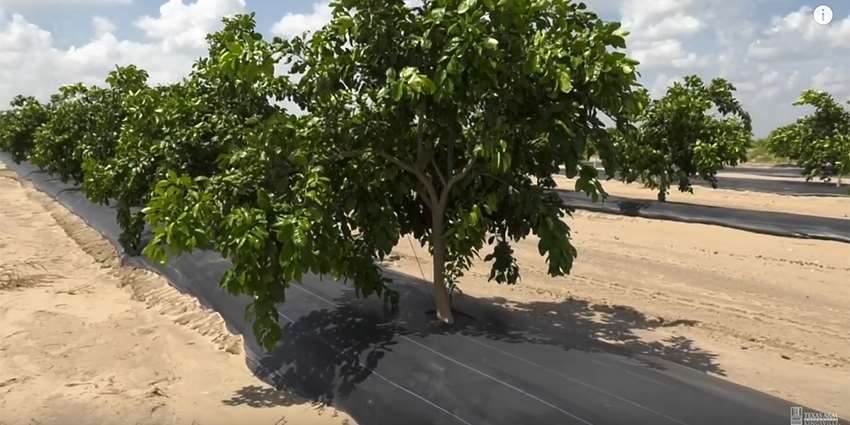Article originally written by Lucas Gregory
The Texas A&M-Kingsville Citrus Center has developed a new video that describes a novel citrus irrigation approach that integrates multiple techniques into a planting and irrigation design ripe with plant health, yield, economic and water conservation benefits for the producer.
The new approach can be custom designed to best fit any citrus irrigation scenario and combines planting trees on raised beds and integrating permeable plastic tarping to cover the beds. Adding drip irrigation atop the beds and under the tarp combines for a high efficiency means to enhance irrigation efficiency in new citrus groves.
The primary benefit of this approach is saving precious irrigation water, but other benefits for growers include decreased disease and pest issues and better average yields and quality in the crop produced. In traditional flood irrigation settings, the combination of planting citrus trees on a raised bed with plastic tarp provides benefits to the crop by elevating the tree and keeping irrigation water off of the tree’s trunk. This can reduce disease transference and potentially yield increased production.
Side-by-side trials shown in the video demonstrate a noticeable difference in tree vigor and production between flood irrigated raised bed trees with and without permeable plastic tarp. Jose Silva, general manager of Edinburg Citrus Grove Care, discussed the importance of permeable plastic tarp for weed suppression advantage over plantings without tarping, thus reducing water use, competition for nutrient resources and grower costs for weed control.
Integrating drip irrigation into the raised bed plantings with permeable plastic tarp has also proven effective in other ways. Growers that have implemented this approach have reported water savings of 25-35% compared to drip irrigated trees without permeable plastic tarp. An additional benefit of drip irrigation is that the grower has better control when water, and also nutrients, pesticides or other applied products, are delivered to the trees all with a lower water application than traditional flood irrigation.
Jud Flowers, owner and manager of Lone Star Citrus Growers in Mission, noted another benefit of drip irrigated, raised-bed elevated trees during summer months when south Texas is susceptible to hurricanes or heavy rainfall events. The drip irrigated orchards result in lower localized water tables than flood irrigated orchards, which in turn produces less risk to the orchard from long-standing water in the field after storm events.
Although drip irrigation combined with raised beds and permeable plastic tarp is an increased capital investment upfront, the many benefits it provides usually offset these costs in the long run. Weed control, irrigation water savings, and lower labor costs combined with commonly realized fruit yield and quality increases factor into the positive economic benefits that the grower can expect if they are considering this novel planting design for new citrus groves.
Adoption of this new raised-bed with permeable plastic tarp planting design by growers is occurring rapidly in the Lower Rio Grande Valley for those investing in new citrus orchards. Shad Nelson, Ph.D., professor and dean of the Dick and Mary Lewis Kleberg College of Agriculture and Natural Resources at Texas A&M Kingsville said, “raised-bed with permeable plastic tarp planting concept is adaptable to other orchard species as well, and has potential to greatly minimize weed and disease pressures, and enhance water savings and fruit production in other crops like pecans, olives, avocados, and other fruit and nut trees.”
The video was produced as part of the Lower Rio Grande Valley Irrigation Education and Outreach program and the Development of a Novel Planting Design and Irrigation Strategy for Water Use Efficiency and Conservation in Citrus project, both funded by grants from the Texas Water Development Board.
Watch the video, titled How raised-beds improve citrus irrigation efficiency, available on YouTube.



